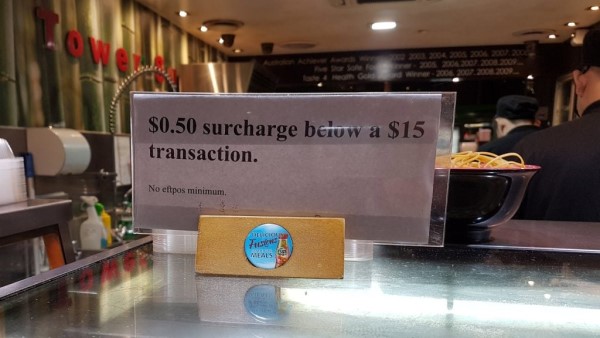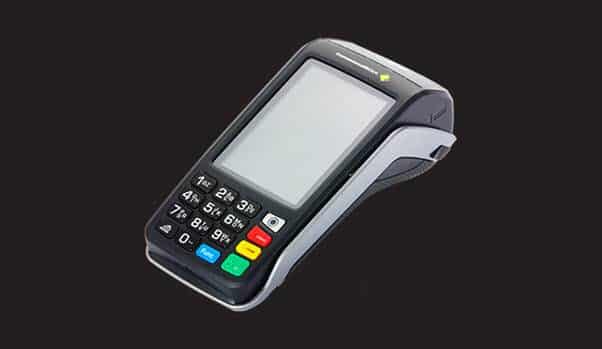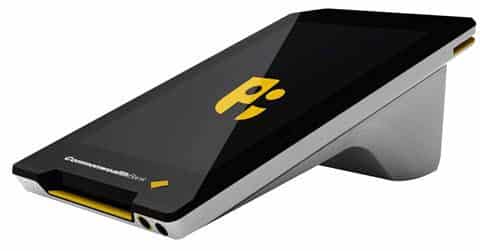Three of the four big banks have announced they will let merchants choose whether their customer's contactless card purchases are processed by Visa, Mastercard or Eftpos. Small business bank Tyro has been offering the choice for more than a year.
This could mean big savings for small businesses because Eftpos is significantly cheaper than Visa or Mastercard for transactions over about $30. But for many years most banks have directed contactless debit and credit payments through the Visa or Mastercard networks. Some small businesses have resorted to surcharging customers for small payments under $10 or $15 to recoup costs.

Many consumers have combination debit and credit cards that can support both Eftpos and Visa/Mastercard transactions. Contactless payments (Tap n Go and PayWave) were introduced to Australia thirteen years ago.
"Since then major banks have automatically routed contactless debit card transactions through higher-cost processing platforms such as Visa and Mastercard," said Australian Retailers Association chief Russell Zimmerman.
"The extra cost has been borne by retailers and merchants."
Now "Merchant Choice Routing" (MCR) (also known as "Least Cost Routing" ) promises savings for small businesses because they can choose the cheapest network option for their business.

Russell Zimmerman said if merchants wanted to use MCR, they have to opt-in, despite regulators urging the banks to provide least cost routing automatically to businesses.
Christopher Zinn, former head of a no-surcharging campaign promoted by some small businesses and American Express, said merchant surcharging is a cost to the business, like electricity.
"My view is we have plethora of payment systems and competition is good, but it has to be transparent.
"If there is a direct charge to the consumer they have to be informed."
Least Cost Routing not available on Albert, yet
Commonwealth Bank has now confirmed that Merchant Choice Routing (also known as Least Cost Routing) will only be available for retailers and other merchants using the "Essential" range of Eftpos terminals and not the increasingly popular Commonwealth Bank Albert terminal.

The Commbank Albert terminal (pic courtesy CBA)
100,000 merchants use Commonwealth Bank's multi-function touch screen POS tablet terminal, known as Albert.
Other merchants using Commonwealth Bank will also miss out on the new choice.
"If your business has a Simple Merchant Plan .... merchant choice routing won't be relevant for you," states Commbank on its website.
A CBA spokesperson told Banking Day this week that MCR will be rolled out to all merchants over the next six months.
"In late 2019 merchant choice routing will be available to merchant customers with other CommBank terminals and third-party owned devices."
Can I choose multiple networks under Merchant Choice Routing?
Merchant Choice Routing (also known as Least Cost Routing) enables the business to choose which payment network processes their customer's transactions. Eftpos transactions are cheaper for business for transactions over about $25 to $30. Under that amount the Visa and Mastercard networks are cheaper. So can businesses choose the cheapest option for under $30 transactions and a different option for transactions over $30?
Commonwealth Bank's MCR offering enables merchants to select different networks depending on the transaction, whereas ANZ only supports merchants choosing one network for all transactions.
For example, a merchant using Commbank could select Mastercard to process transactions under $30 and Eftpos for transactions over $30.
ANZ is charging merchants a flat 25 cents per Eftpos transaction, a big fee hike for transactions under about $25.
ANZ is also demanding retailers display signs at the POS to tell customers about the new routing policy. Russell Zimmerman says that is completely unnecessary and not required by the RBA or other regulators.
Chris Zinn said consumers generally aren't interested.
"I don't need to know which electricity system you use and I don't need to know the payment system you are routing me through, unless you are specifically charging me.
"They are all costs to the business and that's for the business owner to sort out."
How many banks offer Least Cost Routing?
All banks have been ordered to adopt Merchant Choice Routing (also known as Least Cost Routing) and so far three of the big banks, Commonwealth, ANZ and NAB have announced their MCR packages.
Specialist small business bank Tyro introduced least cost routing on an opt-in basis in a product called "Tap & Save" in March 2018.
There is no difference in speed or customer experience between least cost routing and the traditional routing through Visa and Mastercard. However, customers will notice that funds transferred through the Eftpos system are deducted immediately from their account, whereas Visa and Mastercard purchases typically take two or three business days.
Customers who wish to use the Visa or Mastercard system, rather than the Eftpos network, can choose to insert their card into the terminal and complete the purchase by entering their PIN.
Russell Zimmerman is actively encouraging small business to adopt MCR and choose the Australian Eftpos network for their customer's transactions, rather than the global card schemes.
"to secure the vibrancy of the Australian retail industry and the sustainability of the economy."
Looking for small business loans, compare small business loan offers here.
The information contained on this web site is general in nature and does not take into account your personal situation. You should consider whether the information is appropriate to your needs, and where appropriate, seek professional advice from a financial adviser. If you or someone you know is in financial stress, contact the National Debt Helpline on 1800 007 007.